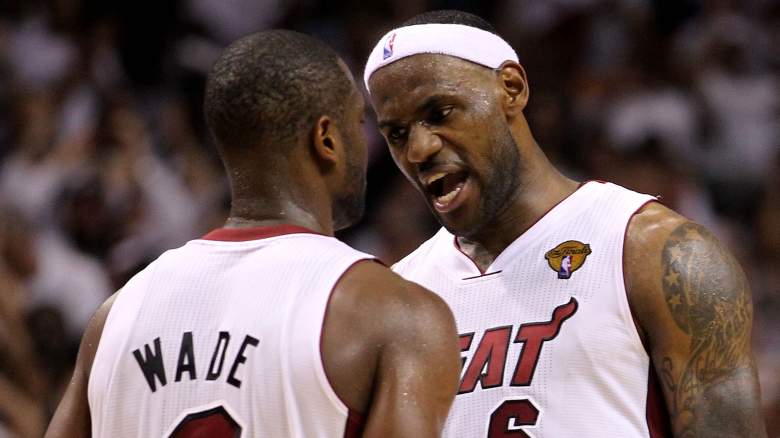
The NBA has seen its share of incredible moments, from breathtaking heroics from the best in the world to heartbreaking collapses that shatter the morale of players and fans alike.
Sometimes, the failures — the chokes — can leave a bigger impact on the game than the successes.
From teams blowing massive leads to top-tier players crumbling under pressure, these chokes have shaped legacies for players and franchises and have provided endless discussion points for fans.
We’ll look at the Top 10 worst chokes in NBA history that changed the trajectory of seasons, careers, and franchises.
10. The 1993-94 SuperSonics Become First No. 1 Seed to Lose in First Round
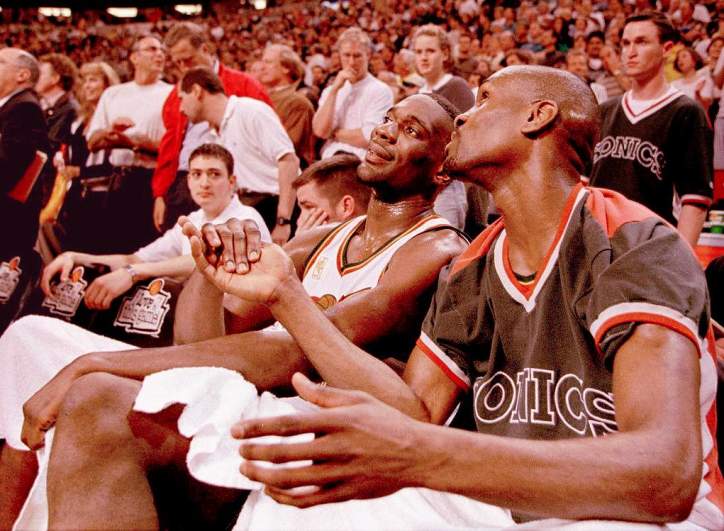
GettySeattle SuperSonics players Shawn Kemp (L) and Gary Payton (L) watch as their teammates wrap up game five of their Western Conference NBA playoff game against the Phoenix Suns in Seattle. The Sonics beat the Suns 116-92 to advance to the conference semi-finals.
The 1993-94 SuperSonics were a true powerhouse, finishing with an incredible 63-19 record, the best in the entire NBA.
The George Karl-coached Sonics had an easy time in the regular season, with players like Gary Payton and Shawn Kemp being standouts. While their offense was stellar, their defense was perhaps their greatest strength, finishing with the second-best defensive rating in the league. It’s no surprise that they were expected to steamroll through the entire playoffs and were the favorite to win it all in a post-Jordan NBA.
The Sonics’ postseason kicked off with what seemed like an easy matchup against the Denver Nuggets, who snuck into the playoffs with a 42-40 record and the lowest seed in the Western Conference. Led by a young Dikembe Mutombo, they were considered a solid team, but the consensus was that the Sonics would make quick work of them. And for the first two games of the series, this seemed like it would become reality, with the Sonics handily winning.
Behind Mutombo’s defensive brilliance, however, the Nuggets were able to steal the next two games. With the decisive game in Seattle, the Sonics were still expected to win the series despite some hiccups. In shocking fashion, however, the Sonics were stunned by the Nuggets in overtime, becoming the first number one seed to fall to a number eight seed.
It was a triumphant moment for Mutombo and the squad, immortalized by a picture of an exhausted Mutombo laying on the court, clutching the basketball post-victory. What was a triumph for the Nuggets was an all-time level collapse for the Sonics, though. One game away from a clean sweep, they crumbled to the lowest seed in the conference. This series will forever remind teams to never underestimate an opponent, no matter how heavily you are favored.
9. Nick Anderson Misses 4 Late-Game Free Throws
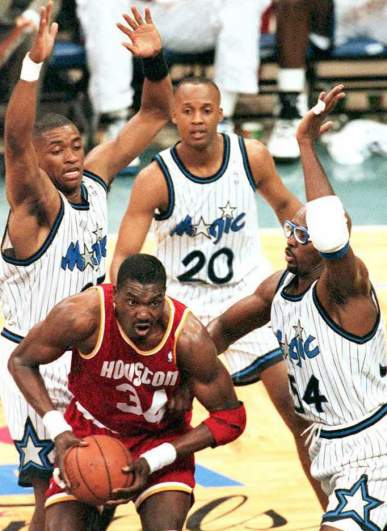
Houston Rockets center Hakeem Olajuwon is triple teamed by Orlando Magic’s (L-R) Nick Anderson, Brian Shaw and Horace Grant.
The 1994-95 Orlando Magic looked to make a huge statement in the first round against the reigning champions, the Houston Rockets. Following a very dramatic Game One, the Magic found themselves up by 3 points with limited time on the clock and with one of their key players, Nick Anderson, on the line with two opportunities to extend the lead. While it seemed as if the Magic were on the verge of a major win, they’re on this list for a reason.
Shockingly, Anderson, typically a 70% or better free throw shooter, missed both of his first pair of free throws. While this did complicate things, Anderson was able to retrieve the ball and was sent back to the line.
In a moment that will haunt Magic fans forever, Anderson proceeded to miss these two free throws as well!
With their golden opportunity at putting the lead out of reach squandered, the Magic then gave up a clutch 3-pointer, courtesy of Kenny Smith, which sent the game into overtime. Following this, the Rockets were able to defeat the Magic to end game one in thrilling fashion.
While this collapse came in the first game of the series, one could say that this blunder set the tone for the rest of the series, one where the Rockets ultimately came out on top.
8. The 2015-16 Thunder Give Up a 3-1 Lead to the Warriors
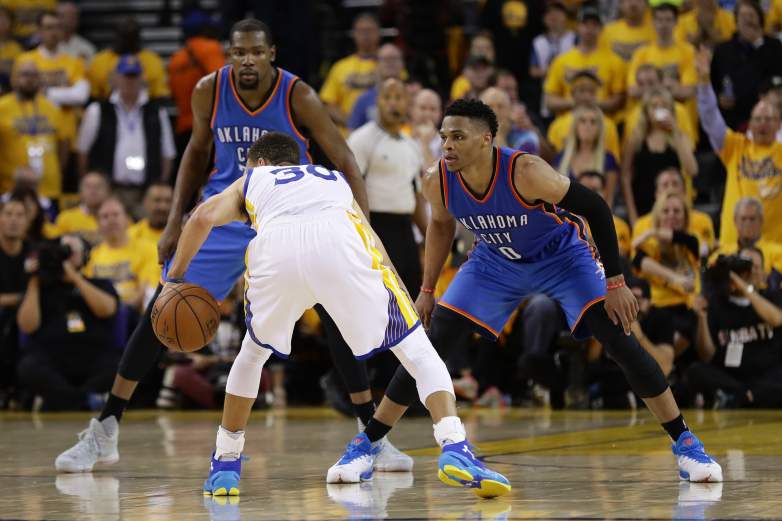
GettyKevin Durant and Russell Westbrook of the Oklahoma City Thunder defend against Stephen Curry of the Golden State Warriors during Game Five of the Western Conference Finals during the 2016 NBA Playoffs.
The 2016 NBA playoffs were some of the most entertaining basketball in recent memory, with the entire postseason being marked by huge moments.
After earning the third seed and surging through the playoffs, the Kevin Durant and Russell Westbrook-led Oklahoma City Thunder found themselves matched up against the reigning NBA champions, the Golden State Warriors, in the Western Conference Finals. The Thunder looked to be on the brink of a huge upset, gaining a 3-1 lead against the Warriors. It was all downhill from here.
Despite injuries to key players like Stephen Curry and Draymond Green, the Warriors shocked the Thunder in Game Five, securing a 120-111 victory. With the series headed back to Oklahoma City for Game Six, many expected them to close out the series here. With a solid lead late in the game, their victory seemed all but guaranteed, but the Thunder again failed to execute, losing to the Warriors once again, 108-101.
The final game in the series saw a masterclass performance from the Warriors. With all the momentum behind the defending champs, the Warriors were able to dispatch of the Thunder 96-88, With the comeback completed, this year’s Thunder team went from possible championship favorites to another blip on the radar.
While the collapse itself was notable, the events following for both teams may be even greater. In the offseason, Kevin Durant shocked the world and signed with the team that just eliminated his former team in the Golden State Warriors. This effectively ended the Durant/Westbrook era in Oklahoma City, with Westbrook being the last player standing from the Thunder’s once promising core.
Both players’ legacies were affected forever by this move, with both reputations taking a large hit. For Durant, fans saw the move as a weak move and one that killed the parity of the league. Remember, this is a Top 3 player leaving for what was already considered the best team in the league. And as for Westbrook, despite some electric seasons afterwards, fans couldn’t help but see him as a guy that just couldn’t take his team all the way.
This entry is notable as it may have changed the direction of the entire league, establishing the Warriors as the team to beat for the next couple of years, while simultaneously shaping the legacies of two of the greatest of this generation.
7. The 2014-15 Clippers Blow a 3-1 Lead to the Rockets
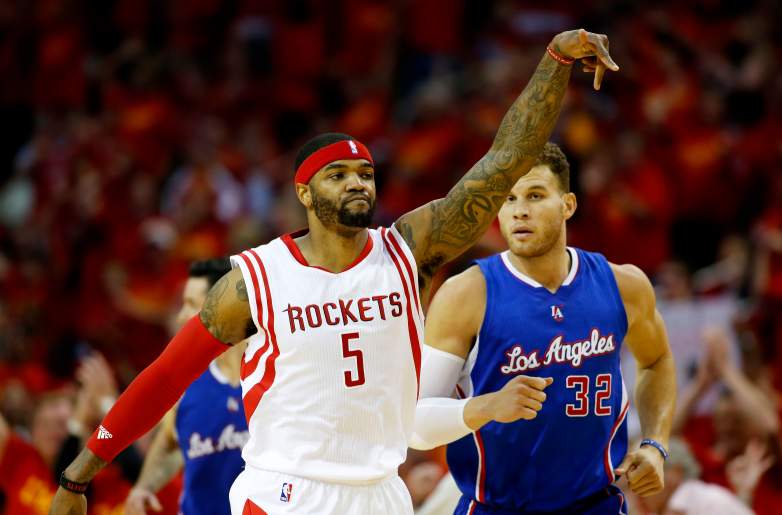
GettyJosh Smith #5 of the Houston Rockets celebrates in the third quarter as Blake Griffin #32 of the Los Angeles Clippers looks on during Game Seven of the 2015 Western Conference Semifinals.
The 2014-15 Los Angeles Clippers were an absolute treat to watch. “Lob City” was stacked with talent, and looked like a legitimate contender to make it out of the Western Conference.
After taking a 3-1 lead in the semifinals against the Houston Rockets, the Clippers looked primed to advance to their first Western Conference Finals in franchise history.
After losing Game Five, the Clippers did not seem to be in a state of panic, expecting to take Game Six. And Game Six seemed to be all Clippers, with the team maintaining a lead for most of the game. The second half, however, was a completely different story, with role players like Josh Smith and Corey Brewer playing out of their minds. The script was flipped, and the almost-guaranteed Clippers victory quickly went south. By the time the final buzzer rolled around, the Rockets had completed an improbable comeback, setting up a crucial Game Seven.
By Game Seven, the Clippers appeared to be mentally defeated. Despite an early lead in game seven, the Rockets were able to step up and seal the deal, advancing to face the Golden State Warriors in the Western Conference Finals.
While the Rockets deserve credit for their excellent team play and tenacity, the Clippers’ inability to close out the series was heavily panned, with their historical struggles to perform under pressure being highlighted. While this iteration of the team stuck around for a couple more years, this was a pivotal moment in shaping the perception of the Lob City Clippers to fans.
6. Dirk Nowitzki & the No.1 Seed Mavericks Collapse in the First Round
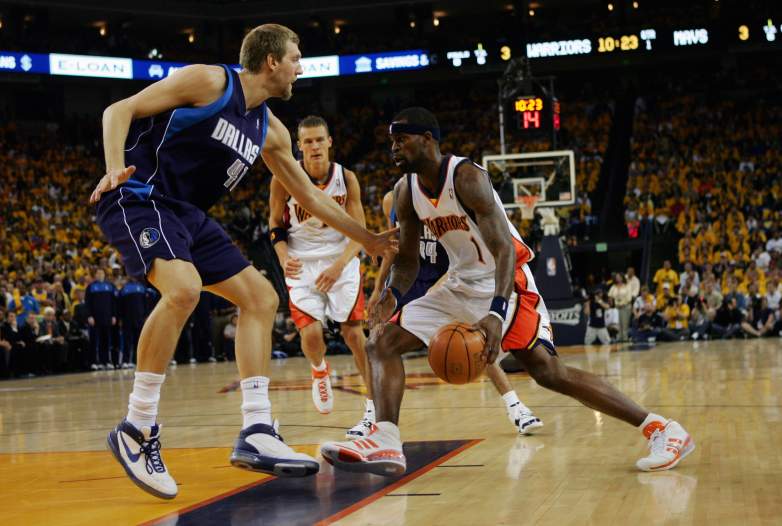
GettyStephen Jackson #3 of the Golden State Warriors drives to the basket against Dirk Nowitzki #41 of the Dallas Mavericks in Game Six of the 2007 Western Conference Quarterfinals.
The 2006-07 Dallas Mavericks came into the playoffs with the best record in the league at 67-15, with star player Dirk Nowitzki earning MVP honors. Fresh off of a loss in the Finals the year prior, the Mavs shattered all expectations for the regular season and looked to be the title favorites in 2007.
Despite these lofty expectations, the first round matchup between the Mavericks and Golden State Warriors could not have went any worse for the regular season powerhouse. The eighth-seeded “We Believe” Warriors, coached by the great Don Nelson and led by Baron Davis and other solid role players, stole game one on Dallas’ home court in what was a taste of how the rest of the series would go.
In each following game, it was apparent that Dallas was rattled. The Mavs seemed to have no answer for Golden State’s scrappy and innovative small-ball style of play, with Dirk having major struggles in terms of consistency. The series came to an end in Game Six, as with their backs against the walls on their home court, the Dallas Mavericks were blown out 111-86.
This collapse had a huge effect on the entire Mavericks organization, but perhaps no one was affected more than their star player, Dirk Nowitzki. Despite his incredible regular season, his legacy was questioned heavily both immediately after this series and in the years following, with many doubting his ability to take a team to the promised land. Luckily, Nowitzki and the Mavericks would redeem themselves four years later by winning their first NBA championship, with Nowitzki effectively silencing his critics.
5. The 1999-2000 Blazers Collapse Late in Game 7
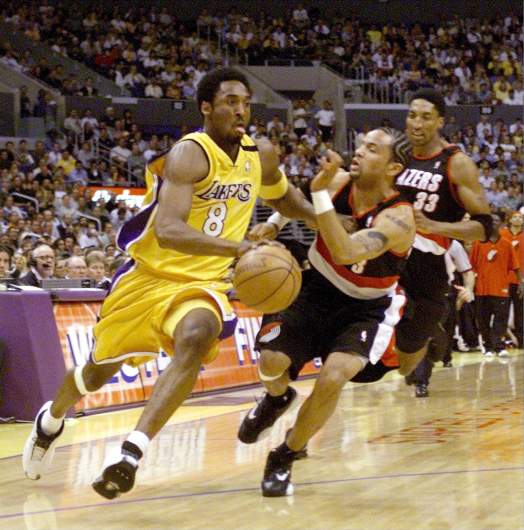
GettyKobe Bryant (L) of the Los Angeles Lakers is pursued by Damon Stoudamire (C) and Scottie Pippen (R) of the Portland Trail Blazers in Game Two of the 2000 NBA Western Conference Finals.
The 1999-2000 Western Conference Finals saw one of the most gut-wrenching chokes in history take place at perhaps one of the worst times possible.
The Portland Trail Blazers, led by veterans like Scottie Pippen and Rasheed Wallace, had a stellar regular season, going 59-23 and finishing with the second best record in the league, behind only the Los Angeles Lakers.
After a grueling playoff run, the Blazers led the Lakers by 15 points during the fourth quarter of the decisive Game Seven of the conference finals. Only a quarter away from their first Finals appearance since 1992, the Blazers just needed to hold the lead they had accumulated.
Unfortunately for them, the rhythm that they had the rest of the series seemed to completely vanish in the most key moment possible. On the backs of star players Shaquille O’Neal and Kobe Bryant, the Lakers outscored Portland 34-13 in the final 12:20 of the game en route to the first finals of the Shaq and Kobe era.
This choke is more potent as it was the last time the Blazers have been this close to a finals appearance. After the loss, this iteration of the team was torn apart and the Blazers have struggled to return to the NBA Finals since. On the other hand, this game marked the start of the Lakers dynasty that ruled the early 2000s.
4. LeBron James’ 2011 Finals Performance
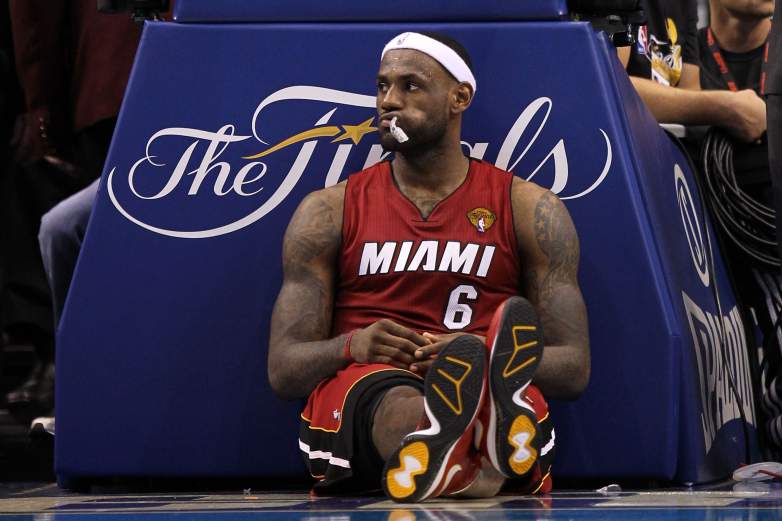
LeBron James of the Miami Heat sits on the court as court attendants mop up liquid which was spilt onto the court against the Dallas Mavericks in the second half of Game Three of the 2011 NBA Finals.
Following the much maligned “Decision,” the LeBron James-led Miami Heat became the villains of the NBA, largely due to James himself. LeBron “taking his talents to South Beach” to form the Big Three alongside Dwyane Wade and Chris Bosh was a move that absolutely rocked the basketball world. And despite the vitriol LeBron and the Heat received, they were still considered heavy favorites to win it all.
After running through the Eastern Conference, the Heat matched up against the Dallas Mavericks in the 2011 NBA Finals. While the Mavericks were an excellent team with a strong veteran presence in their own right — led by star player Dirk Nowitzki and vets like Jason Terry and Jason Kidd — the Heat were still favored to win it all.
However, what should’ve been LeBron’s coronation quickly went sour. While he started strong in Game One, it quickly became apparent in the following games that James was not playing to the highest caliber. The superstar forward was playing with far too much hesitation and passivity. Despite this, the Heat were still able to gain a 2-1 series lead.
In the pivotal Game Four, however, LeBron gave a performance that may be among the worst of his career, scoring only 8 points the entire game while allowing the Mavericks to tie the series up. Following this performance, the Dirk Nowitzki-led Mavericks were able to win two straight and their first championship in franchise history. While the Mavs were celebrated for their tenacity, LeBron was the subject of heavy criticism across the basketball world.
LeBron, considered the best player in the world, only managed 17.8 points per game in the biggest series of his career up to that point. His inability to step up when it mattered most made this series one of the biggest, if not the biggest, lowlights of his career.
King James captured multiple titles following this disastrous performance, but the 2011 Finals will always be perhaps the biggest bruise on James’ legacy. It showed that even the most talented player in the game could succumb to big time expectations.
3. The 2017-18 Rockets Miss 27 Threes in a Row
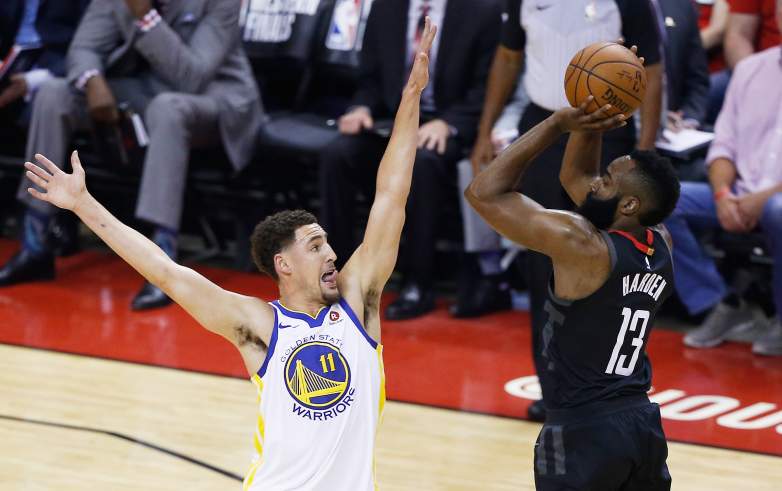
GettyJames Harden of the Houston Rockets shoots against Klay Thompson of the Golden State Warriors in the first half of Game Seven of the 2018 Western Conference Finals.
The 2017-18 Houston Rockets were an absolute regular season juggernaut. Coached by Mike D’Antoni and led by star guards James Harden and Chris Paul with a cast of sharpshooters surrounding them, the Rockets earned the best record in the league at 65-17. Their fast paced offense was lethal, with their shooting being perhaps their strongest trait.
The team wasn’t built to simply dominate the regular season — they were seen as the biggest threat to the Golden State Warriors’ dynasty. The Warriors were seen as the measuring stick that all other teams in the league strived for, and much like everyone expected, these two teams met in the Western Conference Finals. After a grueling first five games, the Rockets found themselves leading the series 3-2. Despite losing Paul, spirits were high as Houston appeared to be on the verge of their first finals berth since the Hakeem era.
While the Rockets faltered in Game Six, Game Seven was back home in Houston, setting the stage for a winner-take-all affair. The Rockets started the game hot, gaining an early double-digit lead. What followed, however, is perhaps one of the biggest collapses in history.
The Rockets, known for their three-point shooting ability, went on an NBA record-breaking cold streak, missing 27 consecutive threes between the second and fourth quarter, with not a single three being made during the third quarter.
The sharpshooting that brought Houston to this point turned on them at the worst possible time. As the Rockets continued to struggle, Golden State dominated. Their third quarter was a pivotal time that gave them the momentum to close out the game. The Rockets lost 101-92, ending their championship hopes.
This was a choke of historic proportions. This collapse wasn’t about just one game — it was seen as an opportunity to disrupt the Warriors dynasty and establish Houston’s team amongst the best to ever do it. Instead, it serves as a reminder that playoff ball can be truly unforgiving, especially when your shots just won’t fall.
2. The 2012-13 Spurs Blow Game 6 of the Finals
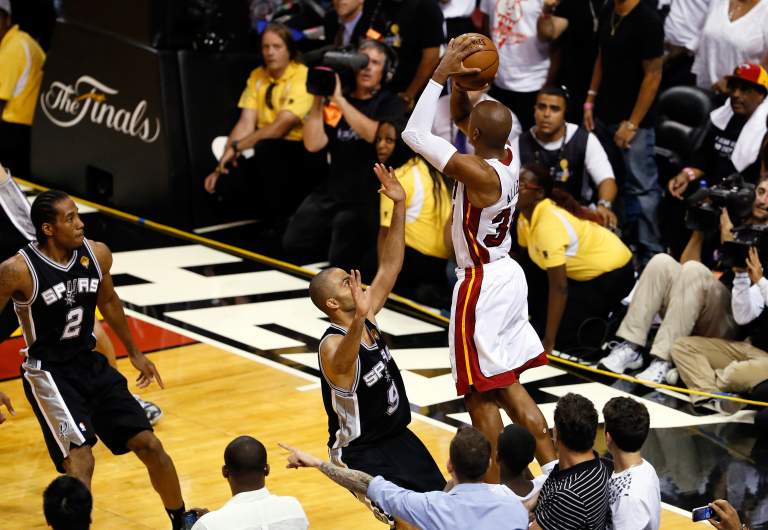
GettyRay Allen #34 of the Miami Heat makes a game-tying 3-pointer over Tony Parker #9 of the San Antonio Spurs in the fourth quarter during Game Six of the 2013 NBA Finals.
The 2013 NBA Finals were absolutely thrilling, with the San Antonio Spurs playing with the poise expected of the franchise, even against a tough opponent like the LeBron-led Miami Heat.
The Spurs found themselves up 3-2 in the series and leading by double digits in the fourth quarter of Game Six, with Tim Duncan in particular having a standout performance. While the Spurs played excellent basketball up to that point in the game, the cracks started to show at the worst possible time.
The Spurs’ offense quickly went off the rails, with the Heat playing swarming defense all quarter. Duncan was held scoreless in the final quarter and the Spurs made uncharacteristically sloppy mistakes. Despite this, the Spurs still saw themselves leading the game in the final minutes.
These final couple minutes will live in infamy, with the Spurs seeming to make every key mistake possible. From missed free throws to costly turnovers, the Spurs appeared to be unraveling.
The final moments of the fourth saw the Spurs up 94-92. The young star Kawhi Leonard was sent to the line with a chance to seal the entire series. While he made his first shot, he bricked the second, setting up one of the most iconic moments in NBA history.
After the Spurs’ controversial decision to sub out Duncan, the Heat took the ball up the court. After a missed three by LeBron, the Spurs failed to secure a crucial rebound. This allowed Chris Bosh to grab an offensive board and kick out the ball to the 3-point line. Unfortunately for the Spurs, Bosh happened to pass to one of the greatest shooters of all time — Ray Allen. Allen, from the corner, drained perhaps the biggest shot of his famed career, tying the ballgame 95-95.
Despite having some time remaining in the fourth, the Spurs failed to capitalize. And even though they had a chance to seal the series in overtime, the Heat’s momentum was just too unforgiving, with the final score being 103-100. Game Seven was their final opportunity to make things right, but they fell again, 95-88.
This collapse was one of the lowest points for the Popovich-led Spurs. For a team lauded for their consistency and decision-making, this was a rare failure on the biggest stage of them all. Game Six serves as a reminder that no matter how methodical and objectively great a team is, they too can fall to big-time pressure.
1. The 2015-16 Warriors Blow a 3-1 Lead in the NBA Finals
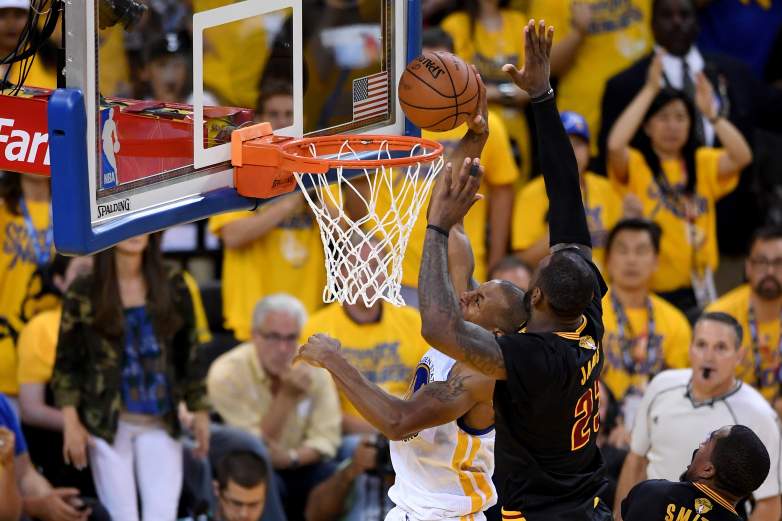
GettyLeBron James #23 of the Cleveland Cavaliers blocks a shot by Andre Iguodala #9 of the Golden State Warriors in Game 7 of the 2016 NBA Finals.
When it comes to the most unforgettable chokes in NBA history, the 2015-16 Golden State Warriors are likely the first team that comes to mind. After a record-breaking 73-9 regular season and excellent play in the playoffs, it seemed like the Warriors were destined to repeat as champions.
The Warriors, after besting the previously mentioned Oklahoma City Thunder, entered the 2016 Finals as overwhelming favorites. Despite facing off against a very strong Lebron-led Cleveland Cavaliers, Golden State jumped out to a 3-1 lead in the series. With the momentum the Warriors had amassed, their coronation as repeat champs seemed inevitable.
What followed is one of the most famous collapses not only in basketball history, but sports history as a whole. Golden State simply appeared to lose focus after game four, with key players failing to deliver. Draymond Green‘s suspension in Game Five was a pivotal moment, as despite the Warriors still holding the series lead, the absence of an on-court leader like Green was felt immensely.
Against all odds, the Cavaliers stole game five from the Warriors in Oakland, with the momentum carrying over for a win in Game Six as well. By the time game seven rolled around, the Warriors looked mentally defeated despite Green’s return.
The fourth quarter of Game Seven began with the Warriors up 83-82. With the biggest prize in basketball on the line, the Warriors faltered. Star point guard Stephen Curry, coming off of one of the greatest regular seasons in NBA history, was uncharacteristically sloppy, racking up four turnovers in the final quarter alone. The blame cannot be shifted to simply Curry though, as the Warriors as whole seemed to be unraveling before our very eyes.
With just 3:39 remaining in the game, the two teams found themselves deadlocked 89-89. After minutes of hard defense by both teams, the Warriors found themselves on a fast break following an offensive rebound. What followed was one of the most iconic moments in NBA history, with LeBron James covering the distance of the floor at an almost inhuman speed for a chasedown block on Andre Iguodala.
This play, known colloquially as the “The Block,” was a game-changer, not only disrupting any momentum the Warriors had but bringing new energy to Cleveland. Shortly thereafter, Kyrie Irving came through for one of the biggest shots in history, sinking a three over Stephen Curry with under a minute to go. This was ultimately the final field goal of the game, with the Cavs, particularly Kevin Love, playing stifling defense to close out the series and complete the most iconic comeback in NBA history.
Game Seven marked the end of an epic series and was an emotional moment for LeBron James and the Cavaliers, with James finally bringing a chip to his hometown.
For the Warriors, however, it served as a reminder that even with the odds stacked heavily in your favor, a championship can slip right through your fingers. Greatness isn’t measured only by how many games you win, but how you finish them.
Comments
10 Worst Chokes in NBA History